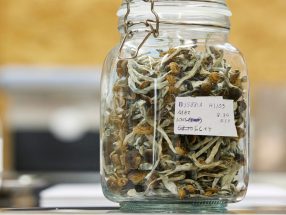Legislation allowing the supervised, adult-use of psilocybin commonly as magic mushrooms is being considered by state lawmakers.
State Sen. Rachel Ventura, D-Joliet, is leading Senate Bill 3695 where Illinois looks to the become the third state — joining Oregon and Colorado — to legalize the adult use of psilocybin.
It’s the latest attempt to pass the Compassionate Use and Research of Entheogens Act, previously introduced by state Rep. LaShawn Ford, D-Chicago, last year.
The naturally occurring psychedelic is seen as "breakthrough therapy" by the U.S. Food and Drug Administration as a way to help those dealing with anxiety, depression, post-traumatic stress disorder and other mental health conditions.
More:4 things to watch for in Pritzker’s budget address
Usage of psilocybin would be limited to state-approved facilities and is promoted by advocates as a way to counter the harmful effects of the war on drugs.
"Once Oregon and Colorado passed their bills, it really did open Pandora’s box," Ventura said in an interview last week. "We want to be smart in the regulation of this, but we also want to make sure that we’re not creating unnecessary barriers so that people can do this in a safe setting."
While not allowing for sale or personal use of psilocybin mushrooms, passage of the bill would open a pathway to decriminalization.
If Gov. JB Pritzker signs the bill into law, law enforcement agencies would expunge the records of those charged with possession starting 180 days after its effective date.
Still, those applying for federal jobs could be subject to drug tests and could be denied employment with a positive test result. Peyote, a small cactus containing the hallucinogen mescaline, or driving while under the influence would also not be decriminalized.
Ventura said implementation would involve several state agencies.
The Illinois Department of Financial and Professional Regulation would be tasked with licensing manufacturers, facilities and facilitators while the state departments of agriculture and public health would respectively lead the production and education aspects.
IDFPR would also house the Illinois Psilocybin Advisory Board to establish training and ethical standards. An appropriations piece is expected to be filed, Ventura said, to get the program off the ground.
The state legalized recreational cannabis in 2020, an industry that has proven to bring-in millions in tax revenues. Those purchasing psilocybin would incur a 15% tax from the state, but unlike marijuana, municipal and county level governments could not levy their own taxes.
How much the state could expect to receive in taxes is ultimately dependent on several factors, primarily based on the product price’s and frequency of use.
Numbers from the Oregon Department of Administrative Services suggest with a $10 per product price-tag and approximately 204,000 sessions per year, it would earn $612,000 over the course of two years also with a 15% tax.
Ventura projects the price in Illinois would be closer to $35 to $40 for each product. The margins will likely be smaller than last year’s $417.6 million in cannabis sales tax revenues, she said.
"The way that psilocybin works is the more that you do it the less of an impact it has on you," she said. "You wouldn’t be using this on a daily basis unless you were microdosing where you weren’t getting that psychedelic aspect to it. So just by that nature alone, we’re going to see a different type of sales."
While Illinois would become the first midwestern state to legalize adult-use of mushrooms, a bill allowing for the research of medical psilocybin is also advancing in Indiana.
The CURE Act has the support of the Illinois Psychedelic Society along with several Democrat co-sponsors.
Contact Patrick M. Keck: 312-549-9340, pkeck@gannett.com, twitter.com/@pkeckreporter.


